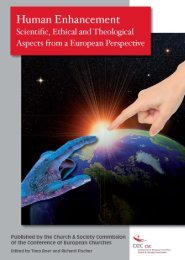Christians and Muslims: Praying together - Churches in Dialogue ...
Christians and Muslims: Praying together - Churches in Dialogue ...
Christians and Muslims: Praying together - Churches in Dialogue ...
You also want an ePaper? Increase the reach of your titles
YUMPU automatically turns print PDFs into web optimized ePapers that Google loves.
<strong>Christians</strong> <strong>and</strong> <strong>Muslims</strong> are common; <strong>in</strong> addition, <strong>Muslims</strong> watch (<strong>and</strong> <strong>in</strong> a way<br />
participate at) Easter festivities <strong>and</strong> <strong>Christians</strong> at Ramadan. Yet limits are never<br />
transgressed, <strong>and</strong> this “participation” is done solely for social reasons, s<strong>in</strong>ce people<br />
are well aware of the differences of faith <strong>and</strong> the approach to salvation.<br />
2. There is no relevant decision of a Pan-orthodox Authority to allow common<br />
prayer with <strong>Muslims</strong>.<br />
3. Theological reasons that are fully understood <strong>and</strong> accepted by the vast majority of<br />
the members of the Orthodox Church have kept <strong>and</strong> cont<strong>in</strong>ue to keep <strong>Christians</strong> <strong>and</strong><br />
<strong>Muslims</strong> apart. Islamic disavowals of the Incarnation of the Word of God <strong>and</strong> the faith<br />
<strong>in</strong> the Holy Tr<strong>in</strong>ity make a shared approach <strong>in</strong> prayer difficult.<br />
These reasons are well known <strong>and</strong> result <strong>in</strong> a reserve on both sides. Every exception merely<br />
verifies the previous rules.<br />
Nevertheless, researchers <strong>and</strong> Church scholars claim that some common moments of prayer<br />
may be possible if they are separate from the frames of worship, given the similarities<br />
exist<strong>in</strong>g between some prayers from Orthodox services <strong>and</strong> some Islamic prayer texts.<br />
Experiences <strong>and</strong> Reactions<br />
A body of experience with <strong>and</strong> responses to common prayers <strong>and</strong> rituals with<strong>in</strong> Europe is<br />
emerg<strong>in</strong>g. Those who attend such rituals <strong>and</strong> prayers mostly react positively. Negative<br />
reactions usually have to await the publication of such events. In the CIBEDO periodical after<br />
publication of a report of Christian-Muslim wedd<strong>in</strong>g the Roman Catholic Church authorities<br />
<strong>in</strong> Germany objected to this ceremony referr<strong>in</strong>g to the church laws. In Berl<strong>in</strong> the Protestant<br />
Church adm<strong>in</strong>istration criticised a pastor after newspapers reported on a Christian-Muslim<br />
wedd<strong>in</strong>g ceremony which <strong>in</strong>volved an Imam. This is a new aspect of the problem of mixed<br />
marriages.<br />
In visit<strong>in</strong>g Mosques <strong>and</strong> <strong>Churches</strong> each group often shares aspects of their tradition<br />
appropriate to the occasion with the other. However, such activities can be ambiguous: is the<br />
call for prayer merely illustrative or a means of mission What are we to make of the<br />
spontaneous s<strong>in</strong>g<strong>in</strong>g of spiritual Muslim songs <strong>in</strong> a church by <strong>Muslims</strong>, or Christian hymns<br />
sung by <strong>Christians</strong> on a mosque visit In the open<strong>in</strong>g ceremony of a new purpose-built<br />
mosque a Church choir was <strong>in</strong>vited to s<strong>in</strong>g <strong>in</strong> the programme. No objection was heard <strong>in</strong> this<br />
case.<br />
Several texts have been published especially from the evangelical side critical of common<br />
prayer <strong>in</strong> general. The Lausanne movement published a critical commentary to the German<br />
Rh<strong>in</strong>el<strong>and</strong> paper on common prayer. The objection was that no dist<strong>in</strong>ction had been drawn<br />
between the act of God <strong>in</strong> creation <strong>and</strong> history on one side (common to <strong>Christians</strong> <strong>and</strong><br />
<strong>Muslims</strong> alike) <strong>and</strong> <strong>in</strong> salvation on the other side (which is special for <strong>Christians</strong>). The<br />
Lausanne movement commented that „Accord<strong>in</strong>g to the Bible the one God reveal<strong>in</strong>g himself<br />
f<strong>in</strong>ally <strong>in</strong> Jesus Christ excludes different perceptions of God. <strong>Muslims</strong> who do not believe <strong>in</strong><br />
Jesus Christ do not pray <strong>in</strong> a different way to the one God, but miss the only God <strong>and</strong> worship<br />
a human perception of God, pray to a none-God. Therefore <strong>Christians</strong> <strong>and</strong> <strong>Muslims</strong> can<br />
neither pray side by side nor <strong>together</strong> to the one God, the Father of Jesus Christ.” The<br />
theological underst<strong>and</strong><strong>in</strong>g of God is <strong>in</strong> this case the criterion for the decision whether a<br />
9















